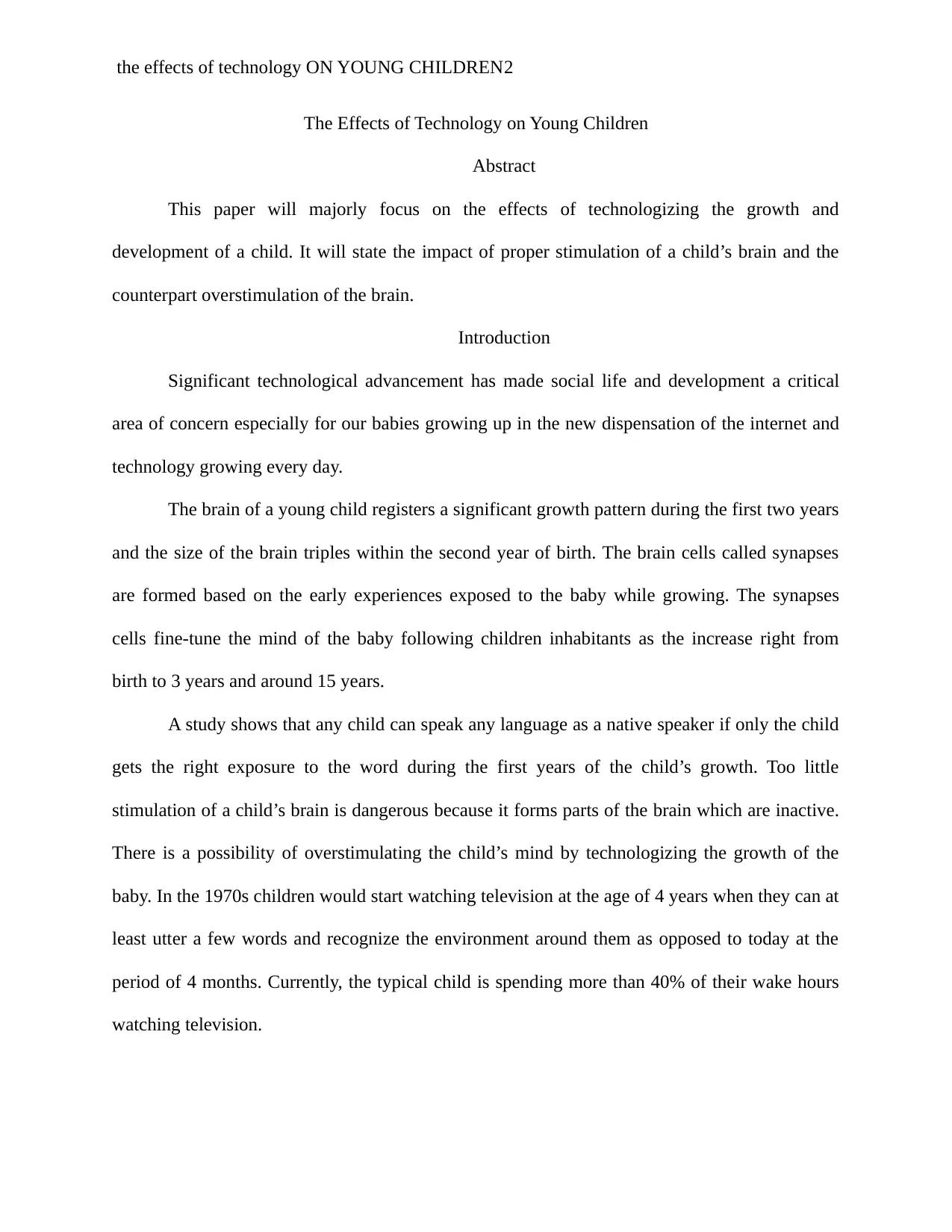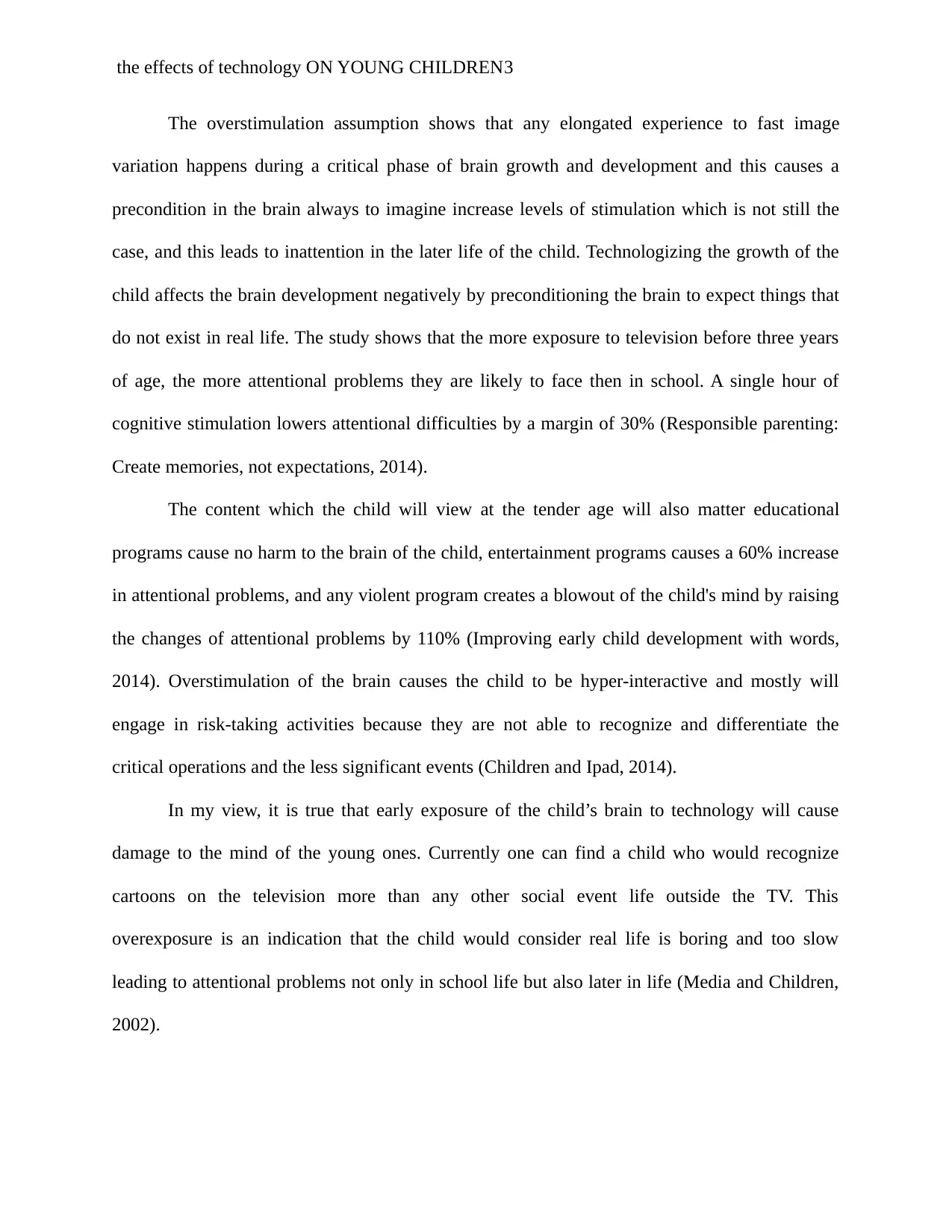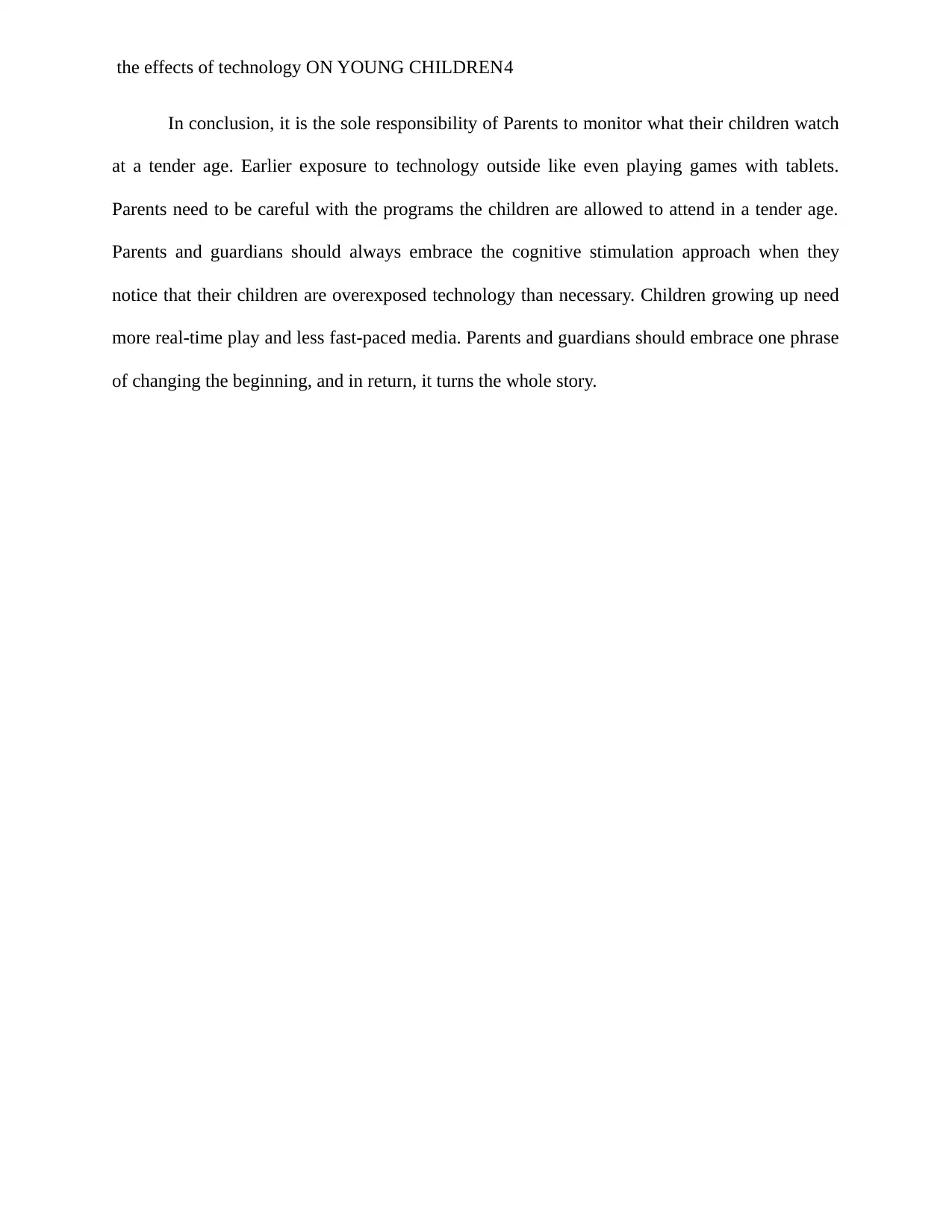A Comprehensive Look at the Effects of Technology on Young Children
VerifiedAdded on 2023/06/15
|5
|865
|357
Essay
AI Summary
This essay examines the impact of technology on the growth and development of young children, focusing on the effects of both proper and overstimulation of the brain. It highlights the critical brain development that occurs in the first two years of life and how early experiences shape brain cell formation. The essay discusses the dangers of both insufficient and excessive stimulation, particularly through technological devices like televisions and tablets. It argues that overexposure to fast-paced media can lead to attentional problems and hyper-interactive behavior in children. The essay concludes by emphasizing the importance of parental monitoring and cognitive stimulation to mitigate the negative effects of technology, advocating for more real-time play and less screen time to ensure healthy development.

Running head: the effects of technology ON YOUNG CHILDREN 1
Student’s Name
University Affiliations
Date
Student’s Name
University Affiliations
Date
Paraphrase This Document
Need a fresh take? Get an instant paraphrase of this document with our AI Paraphraser

the effects of technology ON YOUNG CHILDREN2
The Effects of Technology on Young Children
Abstract
This paper will majorly focus on the effects of technologizing the growth and
development of a child. It will state the impact of proper stimulation of a child’s brain and the
counterpart overstimulation of the brain.
Introduction
Significant technological advancement has made social life and development a critical
area of concern especially for our babies growing up in the new dispensation of the internet and
technology growing every day.
The brain of a young child registers a significant growth pattern during the first two years
and the size of the brain triples within the second year of birth. The brain cells called synapses
are formed based on the early experiences exposed to the baby while growing. The synapses
cells fine-tune the mind of the baby following children inhabitants as the increase right from
birth to 3 years and around 15 years.
A study shows that any child can speak any language as a native speaker if only the child
gets the right exposure to the word during the first years of the child’s growth. Too little
stimulation of a child’s brain is dangerous because it forms parts of the brain which are inactive.
There is a possibility of overstimulating the child’s mind by technologizing the growth of the
baby. In the 1970s children would start watching television at the age of 4 years when they can at
least utter a few words and recognize the environment around them as opposed to today at the
period of 4 months. Currently, the typical child is spending more than 40% of their wake hours
watching television.
The Effects of Technology on Young Children
Abstract
This paper will majorly focus on the effects of technologizing the growth and
development of a child. It will state the impact of proper stimulation of a child’s brain and the
counterpart overstimulation of the brain.
Introduction
Significant technological advancement has made social life and development a critical
area of concern especially for our babies growing up in the new dispensation of the internet and
technology growing every day.
The brain of a young child registers a significant growth pattern during the first two years
and the size of the brain triples within the second year of birth. The brain cells called synapses
are formed based on the early experiences exposed to the baby while growing. The synapses
cells fine-tune the mind of the baby following children inhabitants as the increase right from
birth to 3 years and around 15 years.
A study shows that any child can speak any language as a native speaker if only the child
gets the right exposure to the word during the first years of the child’s growth. Too little
stimulation of a child’s brain is dangerous because it forms parts of the brain which are inactive.
There is a possibility of overstimulating the child’s mind by technologizing the growth of the
baby. In the 1970s children would start watching television at the age of 4 years when they can at
least utter a few words and recognize the environment around them as opposed to today at the
period of 4 months. Currently, the typical child is spending more than 40% of their wake hours
watching television.

the effects of technology ON YOUNG CHILDREN3
The overstimulation assumption shows that any elongated experience to fast image
variation happens during a critical phase of brain growth and development and this causes a
precondition in the brain always to imagine increase levels of stimulation which is not still the
case, and this leads to inattention in the later life of the child. Technologizing the growth of the
child affects the brain development negatively by preconditioning the brain to expect things that
do not exist in real life. The study shows that the more exposure to television before three years
of age, the more attentional problems they are likely to face then in school. A single hour of
cognitive stimulation lowers attentional difficulties by a margin of 30% (Responsible parenting:
Create memories, not expectations, 2014).
The content which the child will view at the tender age will also matter educational
programs cause no harm to the brain of the child, entertainment programs causes a 60% increase
in attentional problems, and any violent program creates a blowout of the child's mind by raising
the changes of attentional problems by 110% (Improving early child development with words,
2014). Overstimulation of the brain causes the child to be hyper-interactive and mostly will
engage in risk-taking activities because they are not able to recognize and differentiate the
critical operations and the less significant events (Children and Ipad, 2014).
In my view, it is true that early exposure of the child’s brain to technology will cause
damage to the mind of the young ones. Currently one can find a child who would recognize
cartoons on the television more than any other social event life outside the TV. This
overexposure is an indication that the child would consider real life is boring and too slow
leading to attentional problems not only in school life but also later in life (Media and Children,
2002).
The overstimulation assumption shows that any elongated experience to fast image
variation happens during a critical phase of brain growth and development and this causes a
precondition in the brain always to imagine increase levels of stimulation which is not still the
case, and this leads to inattention in the later life of the child. Technologizing the growth of the
child affects the brain development negatively by preconditioning the brain to expect things that
do not exist in real life. The study shows that the more exposure to television before three years
of age, the more attentional problems they are likely to face then in school. A single hour of
cognitive stimulation lowers attentional difficulties by a margin of 30% (Responsible parenting:
Create memories, not expectations, 2014).
The content which the child will view at the tender age will also matter educational
programs cause no harm to the brain of the child, entertainment programs causes a 60% increase
in attentional problems, and any violent program creates a blowout of the child's mind by raising
the changes of attentional problems by 110% (Improving early child development with words,
2014). Overstimulation of the brain causes the child to be hyper-interactive and mostly will
engage in risk-taking activities because they are not able to recognize and differentiate the
critical operations and the less significant events (Children and Ipad, 2014).
In my view, it is true that early exposure of the child’s brain to technology will cause
damage to the mind of the young ones. Currently one can find a child who would recognize
cartoons on the television more than any other social event life outside the TV. This
overexposure is an indication that the child would consider real life is boring and too slow
leading to attentional problems not only in school life but also later in life (Media and Children,
2002).
⊘ This is a preview!⊘
Do you want full access?
Subscribe today to unlock all pages.

Trusted by 1+ million students worldwide

the effects of technology ON YOUNG CHILDREN4
In conclusion, it is the sole responsibility of Parents to monitor what their children watch
at a tender age. Earlier exposure to technology outside like even playing games with tablets.
Parents need to be careful with the programs the children are allowed to attend in a tender age.
Parents and guardians should always embrace the cognitive stimulation approach when they
notice that their children are overexposed technology than necessary. Children growing up need
more real-time play and less fast-paced media. Parents and guardians should embrace one phrase
of changing the beginning, and in return, it turns the whole story.
In conclusion, it is the sole responsibility of Parents to monitor what their children watch
at a tender age. Earlier exposure to technology outside like even playing games with tablets.
Parents need to be careful with the programs the children are allowed to attend in a tender age.
Parents and guardians should always embrace the cognitive stimulation approach when they
notice that their children are overexposed technology than necessary. Children growing up need
more real-time play and less fast-paced media. Parents and guardians should embrace one phrase
of changing the beginning, and in return, it turns the whole story.
Paraphrase This Document
Need a fresh take? Get an instant paraphrase of this document with our AI Paraphraser

the effects of technology ON YOUNG CHILDREN5
Works Cited
Christakis, D. (December 28). Media and Children. [Video file].
Retrieved from https://www.youtube.com/watch?v=BoT7qH_uVNo
Guernsey, L. (2004, April 27). Children and Ipad. [Video file].
Works Cited
Christakis, D. (December 28). Media and Children. [Video file].
Retrieved from https://www.youtube.com/watch?v=BoT7qH_uVNo
Guernsey, L. (2004, April 27). Children and Ipad. [Video file].
1 out of 5
Related Documents
Your All-in-One AI-Powered Toolkit for Academic Success.
+13062052269
info@desklib.com
Available 24*7 on WhatsApp / Email
![[object Object]](/_next/static/media/star-bottom.7253800d.svg)
Unlock your academic potential
Copyright © 2020–2026 A2Z Services. All Rights Reserved. Developed and managed by ZUCOL.





